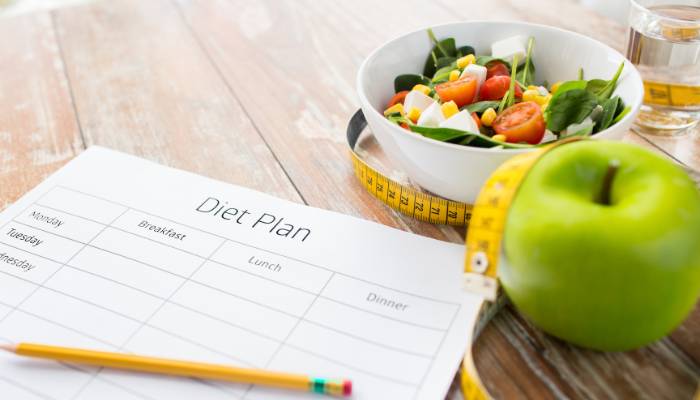Eating frequent, small meals throughout the day can help to maintain energy levels and improve metabolism. This type of eating pattern can also help to reduce craving and help to reduce the risk of overeating, since you are having smaller portions more often. No wonder, the benefits of eating small frequent meals is significant in terms of weight loss as well.

It is healthy to eat five meals a day
Eating five meals a day can be beneficial for some people, as it can help control hunger and cravings, and provide the body with a steady supply of nutrients throughout the day. However, it is important to note that this type of meal plan may not work for everyone. Furthermore, the meals should be balanced and nutritious, and should include plenty of fruits, vegetables, whole grains, and lean proteins. Ultimately, it is important to discuss any dietary changes with a healthcare provider before making any major changes.
Science behind small meals and cite studies
The science behind small meals is rooted in the concept of energy balance. Eating small meals more frequently throughout the day can help to regulate energy balance, meaning that the number of calories consumed is balanced with the number of calories burned. This can help to maintain a healthy weight, as well as reduce unhealthy cravings.
Studies have shown that frequent meals can help to reduce hunger and cravings, as well as regulate blood sugar levels and improve metabolic health. One study found that participants who ate six small meals per day had lower levels of hunger hormones, improved metabolic markers, and improved cholesterol levels compared to those who ate three larger meals. Another study found that subjects who consumed six smaller meals per day had improved satiety and appetite control, as well as better glycemic control, compared to those who ate three larger meals.
In conclusion, the science supports the concept of small meals more frequently throughout the day. Eating this way can help to regulate energy balance, reduce hunger and cravings, and improve metabolic health.
Small meals or dieting ?

The choice to small meals or dieting depends on the individual and their goals. Some people may find it easier to stick to small meals throughout the day, while others may find that dieting works better for them. Ultimately, the best choice is the one that works best for the individual.
Plan for your weight loss
Tummy reduction programs are effective when one follows a strict exercise routine and a balanced diet. It is important to also understand that eating less doesn’t necessarily mean weight loss. Eating less or starving can lead to lethargy, low energy levels, and weakness. Therefore, a well-planned program including diet and exercise is the right way to achieve the desired weight loss.
Dieting also works
The key takeaway from this is that dieting is not about starving yourself, but rather about making healthier food choices and exercising more to reach a healthy weight. It is important to make adjustments to your diet and calorie intake based on your weight goals, rather than simply cutting down on food intake.
What diet do dietitians recommend?
Dietitians typically recommend eating small meals every 3-4 hours throughout the day. Eating small meals can help to keep your energy levels up and prevent overeating. Some examples of small meals include:
- A whole grain toast with peanut butter and a banana
- Greek yogurt with fresh berries and nuts
- A smoothie with almond milk, chia seeds, banana, and spinach
- A turkey and avocado wrap with carrots and hummus
- A quinoa bowl with grilled vegetables and feta cheese
- A tuna salad with avocado and cucumber
- A vegetable soup with quinoa
- A hard boiled egg and whole wheat crackers
- A veggie burger with sweet potato fries
- A burrito bowl with black beans and grilled vegetables.
What actually goes on !

It can be difficult to realize, but when you eat frequently, you often eat more than is necessary and end up accumulating extra calories. When talking the benefits of eating small frequent meals, having smaller dietary intake throughout the day does not deprive the body of the nutrition it requires, and having food now and then ensures you do not overeat. Healthy foods and snacks must be included in small meals. A good dietician is a great resource for this.
When we eat big meals at huge intervals of time, the body is already feeling quite hungry and on seeing food we eat as much as we can t avoid those hunger bites we feel on those big intervals of time.
Why these small meal helps ?
Eating smaller meals will also not keep you away from food and you will not have those cravings. When a person is hungry he/she tends to eat whatever comes in sight. This leads to consuming even the unhealthy and junk food. This is the reason the weight never comes down.
When you feel hungry between small meals
If you feel hungry between meals, snack on some nuts or fresh fruits; they are high in fiber and will help to curb your hunger. Drink lots of water throughout the day, but not with meals as this can cause bloating and make you feel heavy. Whenever you feel hunger, don’t ignore it; have a light snack or meal to make you feel better.
Conclusion
When we review the benefits of eating small frequent meals, it turns out to be very effective tool for weight loss. Eating small meals throughout the day can help to control hunger and cravings, prevent overeating, and provide the body with consistent energy. Additionally, eating small meals can help to reduce total calorie intake, as well as provide essential vitamins and minerals. With careful meal planning and portion control, small meals can be a great way to reach your weight loss goals.

Lifebing is driven by an unrelenting passion for promoting health and well-being, our team is wholly committed to curating exceptional content and immersive experiences.
